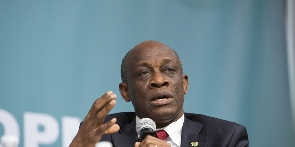A former Finance Minister, Seth Terkper told the government to re-analyze its decision to impose a 1.75 percent E-Levy on electronic transactions.
According to him, consumers were already paying the communication service tax therefore another tax in that regard will be a burden.
“CST is a service tax and is a consumption tax because ultimately it is consumers that are going to pay. Even though it is businesses that are supposed to pay, it will be pushed to the consumer,” he noted.
Read the full story originally published on November 25, 2021 by GNA
Seth Terkper, a former Minister of Finance, has urged the Government to rethink its decision to impose a 1.75 percent E-Levy on Mobile Money and other electronic transactions.
He said the Mobile Money sector was relatively new, and that taxation of financial services under the new economy must focus on core financial services that had matured.
The former Finance Minister, also a tax consultant, said this when he shared his views on the 2022 Budget at a virtual meeting organised by the PFM Tax Africa on Wednesday.
Mr Terkper said consumers were already paying the existing Communication Service Tax (CST), which had a similar objective as the E-Levy – to support entrepreneurship and create employment opportunities for the youth.
“CST is a service tax and is a consumption tax because ultimately it is consumers that are going to pay. Even though it is businesses that are supposed to pay, it will be pushed to the consumer,” he noted.
The E-Levy, which was announced by the Finance Minister during the 2022 Budget presentation in Parliament on Wednesday, imposes a 1.75 percent tax on mobile money and other electronic (E) transactions that exceed ¢100 per customer per day.
The announcement has since attracted varied reactions among the public concerning the appropriateness of the levy.
Whereas a section of the public completely rejects the levy, others have called for a downward review of the rate to ensure that it did not stifle interest in digital payment services.
Mr Terkper described as ambitious the GH¢100.51 billion revenue targets set by the Government, emphasising that “the last time we hit 17.5 percent of GDP in terms of revenue as targeted by the government in 2022 was pre-rebasing.”
He, therefore, urged the Government to take steps to automate the domestic tax system and make the tax regime flexible.
“When you make the tax regime complex, only few people will comply. Now you must file separate returns for VAT, GetFUND, NHIL, and so on.
“The GRA is going to collect these taxes separately and it complicates administration. This is an authority that is not automated. So, we need a comprehensive reform,” he said.
The Government is seeking approval from Parliament to spend GH¢137.5 billion for the 2022 fiscal year.
The amount, which is 27.4 percent of Gross Domestic Product (GDP), represents an increase of 23.2 percent over the 2021 projected outturn of GH¢111.6 billion.
Out of the amount, compensation for employees is projected at GH¢35.84 billion, goods and services are also projected at GH¢9.14 billion, with interest payments projected at GH¢37.44 billion.
Click to view details



Business News of Friday, 25 November 2022
Source: www.ghanaweb.com

















